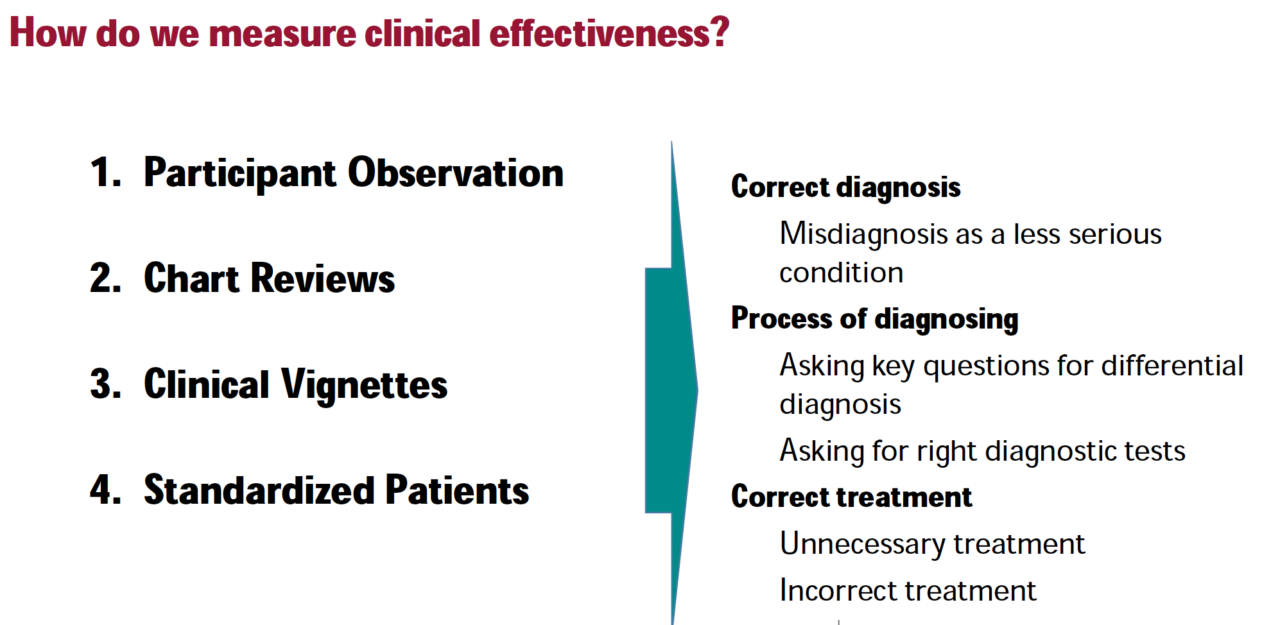Overview
Quality of care is one of the most important intermediate outcomes of a health system. However, quality has unfortunately, been long neglected by most health reformers in low- and middle-income countries like India. Quality has three distinct aspects: clinical effectiveness, patient centeredness, and patient safety. This session will focus on the first aspect – clinical effectiveness.
Clinical effectiveness is the provision of health services based on scientific knowledge and avoiding both overuse of inappropriate care and underuse of effective care. Clinical processes, such as providing the correct clinical assessment, diagnosis, or treatment, are the cornerstones of effective care. The most important consideration for clinical effectiveness is the extent to which a diagnosis or treatment advice is based on evidence or standard guidelines and are shown to impact health outcomes. Without clinically effective care, i.e., correct treatment and diagnosis, access to and utilization of healthcare are often meaningless.
This session will introduce the concept of clinical effectiveness and the different ways in which it can be measured. Drawing on primary research in India and examples from the COVID-19 pandemic, this session will discuss the importance of focusing on clinical effectiveness in health reforms and raise some key challenges in achieving this in India.
The session is designed for clinicians, practitioners, and researchers who are interested in understanding quality assessments and brainstorming about ways to improve quality of healthcare in India. Some familiarity with symptoms and basic primary level treatment advice for common illness conditions like tuberculosis, pre-eclampsia, and heart attack is desired.
Reading
- Das, J., Holla, A., Das, V., Mohanan, M., Tabak, D., & Chan, B. (2012). In Urban And Rural India, A Standardized Patient Study Showed Low Levels Of Provider Training And Huge Quality Gaps. Health Affairs, 31(12), 2774–2784. https://doi.org/10.1377/hlthaff.2011.1356
- Holla, A. (2013). Measuring the Quality of Health Care in Clinics. 37. https://www.globalhealthlearning.org/sites/default/files/page-files/Measuring%20Quality%20of%20Health%20Care_020313.pdf
- Kruk, M. E., Gage, A. D., Arsenault, C., Jordan, K., Leslie, H. H., Roder-DeWan, S., Adeyi, O., Barker, P., Daelmans, B., Doubova, S. V., English, M., García-Elorrio, E., Guanais, F., Gureje, O., Hirschhorn, L. R., Jiang, L., Kelley, E., Lemango, E. T., Liljestrand, J., … Pate, M. (2018). High-quality health systems in the Sustainable Development Goals era: Time for a revolution. The Lancet Global Health, 6(11), e1196–e1252. https://doi.org/10.1016/S2214-109X(18)30386-3
Experience This Session
- View presentation slides here: HSA Session 5.
- Watch seminar session here.
